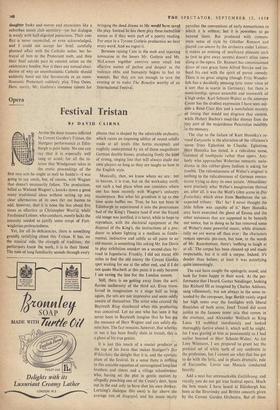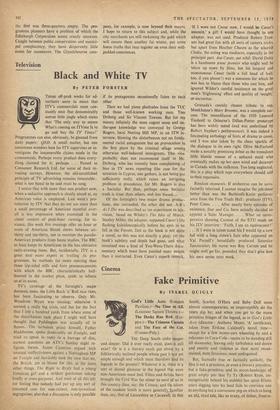Opera
Festival Tristan
By DAVID CAIRNS
AFTER the deep trauma inflicted by Covent Garden's Tristan, the Stuttgart performance at Edin- burgh is pure balm. No one can say that it is especially well sung or acted; for all the in- terest that Windgassen takes in the erotic proceedings of the first two acts he might as well be Isolde's—I was going to say uncle, but, of course, with Wagner that doesn't necessarily follow. The production, billed as Wieland Wagner's, knocks down a good many traditional ideas without setting up any clear alternatives of its own (let me hasten to add, however, that it is none the less about five times as effective as Christopher West's), while Ferdinand Leitner, who conducts, mostly lacks the intensity needed to justify some tempi of Furt- waglerian protractedness. '
Yet, for all its deficiencies, there is something grandly satisfying about this Tristan. It has, on the musical side, the strength of tradition; the performers know the work, it is in their blood. The note of long familiarity sounds through every phrase that is shaped by the admirable orchestra, which raises an imposing edifice of sound solidly made at all levels (the horns excepted) and mightily underpinned by six of those magnificent German double basses, producing freely the kind of strong, singing line that will always elude our own players so long as they are taught to bow in the English style.
Musically, then, we know where we are : not in heaven, it is true, but on the workaday earth, not such a bad place when one considers where one has been recently with Wagner's unhappy masterpiece. But what his grandson is up to this time quite baffles me. True, he has not been in Edinburgh to superintend it into the procrustean bed of the King's Theatre (and if ever the frayed old image was justified, it is here), while to hope to reproduce, with the electrical equipment at the disposal of the King's, the instructions of a pro- ducer to whom lighting is a medium as funda- mental, instinctive and subtle as oil paint to an old master, is something like asking Mr. Joe Davis to play exhibition snooker on a second-class by- road in Jugoslavia. Frankly, I did not travel 400 miles to find the old enemy the Covent Garden spot waiting for me at the other end, and if I do not quote Macbeth at this point it is only because I am saving the line for the London season.
Still, there is no getting away from the acri flavine uniformity of the third act. Even trans- ferred in imagination to a stage half as large again, the sets are not impressive and seem oddly unsure of themselves. The artist who created the Bayreuth Ring slumbered when this production was conceived. Let no one who has seen it but never been to Bayreuth imagine that he has got the measure of Herr Wagner and can safely dis- miss him. The fact remains, however, that whether or not it has been finally slain in transit, this is a ghost of his true genius.
It is just this touch of a master producer at the top of his form that makes Stuttgart's Der Wildschiitz the delight that it is, and the operatic plum of the festival. In a sense there is nothing to this amiable equation of unrecognised long-lost brothers and sisters and a village schoolmaster who, having set the plot in gentle motion by allegedly poaching one of the Count's deer, turns out in the end only to have shot his own donkey. Lortzing's dialogue (his own) is far above the average run of Singspiel, and his music nicely parodies the conventions of early romanticism in which it is written; but it is powerless to go beyond 'them. But produced with consum- mate sense of style by Gunther Rennert and played con amore by the orchestra under Leitner, it makes an evening of unalloyed pleasure such as (not to give away secrets) doesn't often come along at the opera. Dr. Rennert has commissioned decor of rare grace from Alfred Siercke and im- bued his cast with the spirit of purest comedy. There is no great singing (though Fritz Wunder- lich has a decidedly pleasing lyric tenor voice of a sort that is scarce in Germany), but there is musicianship, spruce ensemble and teamwork of a high order. Karl Schmitt-Walter as the amorous Count has the drollest expression I have seen out- side a Rend Clair film and a nonchalant mastery of timing that would not disgrace that context, while Hubert Buchta's toad-like dismay fixes the tiny part of the majordomo Pancratius indelibly in the memory.
The clue to the failure of Kurt Honolka's re- vised Euryanthe is the alteration of the villainess's name from Eglantine to Claudia. Eglantine, Herr Honolka has stated, is a ridiculous name, ' redolent of toothpaste rather than opera.' Any- body who approaches Weberian romantic melo- drama in this rubber-glove fashion is asking for trouble. The ridiculousness of Weber's original is nothing to the ridiculousness of German roman- ticism trying to deny its own nature. 'Absurdities' were precisely what Weber's imagination thrived on; after all, it was the Wolf's Glen scene in Der Freischiitz which drew from Beethoven the un- expected tribute : 'Ha! ha! I never thought the little fellow was capable of it.' Herr Honolka may have exorcised the ghost of Emma and the other nuisances that are supposed to be beneath our notice, but in doing so he has removed some of Weber's most powerful music, while dramati- cally we are worse off than ever : the characters remain operatic pin-men, but now, in the words of Mr. Ramsbottom, there's 'nothing to laugh at at all.' The corpse has been cleaned up and made respectable, but it is still a corpse. Indeed, it's deader than before; at least it was putrefying quite interestingly.
The cast have caught the apologetic mood, and look far from happy in their work. At the per- formance that I heard, Gustav Neidlinger, looking like Richard III as imagined by Charles Addams, sang villainously, but not always in the sense in- tended by the composer, Inge Borkh vainly urged her high notes over the footlights with liberal flourishes of both arms, Josef Traxel did scant justice to the famous tenor aria that comes in' the overture, and Alexander Welitsch as King Louis VI wobbled inordinately and looked thoroughly furtive about it, which well he might, for I was glaring at him as passionately as I had earlier beamed at Herr Schmitt-Walter. As for Lore Wismann, I am prepared to grant her the prettiest set of white teeth of any soubrette in the profession, but I cannot see what that has got to do with the lyric, and in places dramatic, role of Euryanthe. Lovro von Matacic conducted heavily.
Add a neat but unremarkable Entfiihrung, and vocally you do not get true festival opera. Much the best music I have heard at Edinburgh has been at the Stravinsky and Britten concerts given by the Covent Garden Orchestra. But of these the first was three-quarters empty. The pro- gramme planners have a problem of which the Edinburgh Corporation seems crassly unaware. Caught between public conservatism and munici- pal complacency, they have desperately little room for manoeuvre. The Glyndebourne corn- pany, for example, is now beyond their means. I hope to return to this subject and, while the city merchants are still reckoning the gold which will ensure them another fat winter, put some home truths that may register on even their well- padded consciences.



































 Previous page
Previous page